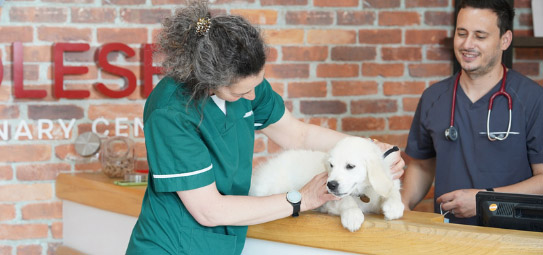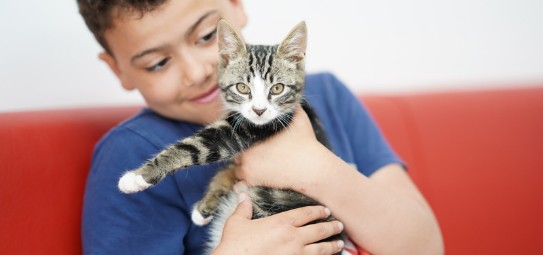
Get Claygate Vets’ top tips for getting a new pet rabbit
September 7, 2022
Even though rabbits are ridiculously cute, fluffy, and affectionate, they require much more care than what you might initially think. Currently, there are approximately 1.1 million pet rabbits in the UK and many are incorrectly kept. So, in celebration of International Rabbit Day (on the 22nd of September) the team at Claygate Vets have formulated a guide filled with adoption, purchasing, and welfare advice.
If after reading our article you have any additional tips that could help other new rabbit owners, please do share them on our Facebook page.
Share your rabbit tips on Facebook
The veterinary team at Claygate Vets love meeting and treating rabbits, so in a nod to International Rabbit Day, they have answered some of the most common questions they get asked about rabbits below.
Rabbit FAQs
Where do I buy a rabbit from?
The best way to buy your rabbit is through a local animal shelter, rescue group, or rabbit adoption agency. Visit the websites https://www.petfinder.com/ and http://rabbit.org/ if you are unsure about where to find animal shelters or rabbit rescue groups in Surrey or another area.
Rescuing rabbits comes with many advantages on top of knowing you are giving a pet in need a forever home. Usually, rescue rabbits are desexed, vaccinated, wormed, microchipped, and better socialised compared to rabbits from a pet store. Adoption fees are often less than shop prices too.
Should I get more than one rabbit?
Vet Darren recommends that getting two rabbits rather than one is better for them. Rabbits are extremely social animals and can get very lonely without a mate, however, the two individuals must get along to ensure they can live happy and healthy lives together. When it comes to the best pairings, Darren advises that a neutered male and female are typically the easiest to pair. Pairs of males or females can live together (better if they are litter mates), but be advised that some rabbits just won’t get along.
How much does rabbit care cost?
Some rabbits can live for up to 10 years so it is wise to think carefully about whether you can afford to put in the time, effort, and money for the care of a new rabbit, or rabbits.
According to our vet, there are 7 initial purchases you will need to make to keep your pet bunny safe and content:
- Multilayer enclosure (rabbit hutch) which can be found at your local pet shop
- Food dish and water bottle
- Litter box
- Chew toys
- Bedding (aspen chips, paper, straw)
- Litter scoop and pet-friendly disinfectant
- Fresh vegetables, pellets, and hay
- Veterinary care if your rabbit is not yet neutered, vaccinated, or microchipped
Do rabbits need to see a Vet?
As well as the initial veterinary care needs listed above, bringing your bunny to our Claygate veterinary practice every 6 to 12 months (including their annual vaccination & check-up) can help catch symptoms of illness before they become serious problems. One of our experienced Vets will usually check your rabbit’s teeth, weight, heart rate, eyes, and ear health. This regular exam will also help to build a relationship with your Vet, as well as giving you an opportunity to ask them any questions you have and get their advice.
If you would like to know more about rabbit veterinary care, including advice on rabbit nutrition, you can always get in touch with us.
What is rabbit enrichment?
In the wild, rabbits run, jump, dig, forage for food, socialise with other rabbits, and have alone time. It’s important to give your rabbit what they need to fulfil these natural behaviours to help them stay happy, active, and healthy – this is called enrichment.
Your rabbit will need at least one hour a day to play outside their enclosure and direct sunlight will help them get the vitamin D they need for digestion – be careful in warm weather. A secure rabbit run is the ideal solution, or a potter in your garden if it’s safe. You can also give them rabbit toys to play with and chew, obstacles to navigate, and a playmate. Digging boxes and foraging trays are easy to make too. Different rabbits have different temperaments; being aware of the triggers for your pet and what makes them moody can help you care for them too.
Considerations to make before getting a rabbit
There are several other elements to consider before purchasing a new bunny. Our Vet Darren shares these here:
Breeds
There are around 50 breeds of rabbit, some of them make good pets and others not so much. Popular pet breeds include the Holland lop, Lionhead, and Dwarf Lop rabbits.
Age
Young rabbits chew on just about everything to develop their jaw
Teenage rabbits (3 months old) are very energetic and will need extra playtime
Adults (when neutered) are perfect for households with younger children
Rabbit pairings should be of a similar age to help them relate to each other
Allergies
It is important to know whether anyone in your household is allergic to rabbits, because this is one of the main reasons so many rabbits end up in shelters.
Do you have any tips for people thinking of buying a new rabbit?
Share your rabbit tips on Facebook
Overall, rabbits can make great household pets if you learn how to socialise them, read their body language, and provide the right environment & enrichment to keep them happy, healthy, and comfortable. We hope you found our advice helpful.





